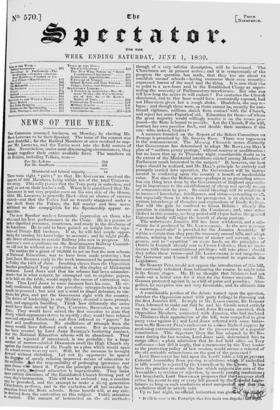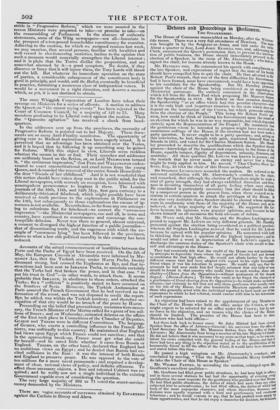NEWS OF THE WEEK.
Tim Commons resumed business, on Monday, by electing Mr. SHAW LEFEVRE to be their Speaker. The issue of the contest was never doubtful ; for the Radical Members at once resolved to sup- port Mr. LEFEVRE, and the Tories went into the field certain of defeat. Nevertheless, under most discouraging circumstances, they brought together their entire available force. The numbers on
the division, including Tellers, were—
For Mr. Lefevre 319 For Mr. Goulburn 301
Ministerial and Liberal majority IS There were eight " pairs; " so that Mr. Grumman; received the xupport of 309 Members, being within ten of the total Conserva- tive array. This rally proves that the Tory party is unbroken, and ready to act on their leader's call. When it is considered that Mr. GOOLIIURN is not very popular even on his own side of the House, whilst Mr. IA:towns is generally liked-that no chance of success existed-and that the Torie3 had so recently staggered under a blow dealt from the Palace, the full muster and firm nerve exhibited on the comKtition for the Speakership appear re- markable.
The new Speaker made a favourable impression on those who witnessed his first performances in the Chair. He is a person of rather dignified presence .courteous, and ready in the discharge of his functions. He is said to have gained an insight into the mys- teries of Private Bill business. If so, he will find ample oppor- tunity for turning his knowledge to account ; and he might profit- ably direct attention to certain Railway jobs now in progress. Mr. Lersvne's own experience on the Southampton Railway Commit- tee will not be without use to a Private Bill Reformer.
The motion for a grant of 30,000/. to set on foot the new scheme of National Education, was to have been made yesterday ; but Lord Jens RUSSELL early in the week announced its postponement to Friday the 14th of June. Insulting cheers front the Opposition benches proclaimed Tory exultation at this display of Ministerial weakness. Lord JOHN said that his scheme had been Misunder- stood-but in what respect, he attempted not to explain: papers, to be laid on the table, would supply the means of correcting mis- takes. Thus Lord Joint in sonic measure hurt his case. He vir- tually confessed, that under the prevalent misapprehension it was unsafe to proceed; but said not a word to dispel delusion, to vin- dicate his plan, and put the Goverment right with the country. The duties of leadership, in any Ministry, demand a more prompt, frank, and energetic handling. Think how differently the cause would have been served by Fox, CANNING, BROUGHAM, or even Pears They would have seized the first occasion to state that clearly which opponents strove to mystify ; they would have refuted errorand exposed falsehood; and then referred to "papers" for proof and confirmation. No ebullitions of triumph from the enemy would have followed such a course. But an impression has been created by Lord JOHN RussELL's hesitating conduct, that the National Education scheme will be abandoned. That it will be rejected if introduced, is too probable ; for a large lumber of narrow-minded Dissenters swell the High Church cry against the instruction of the People on a plan which would open the school-room to every sect. Still, let the measure be brought forward without shrinking. Let not its opponents he spared the disgrgep.of openly refusing improved means of education to the millions; .,*et the responsibility of prolonging ignorance rest upon those wlili. brave it. Upon the principle proclaimed by the Church party,-ayat,tional education is impracticable. They insist RPM certain doctrines of the Established Church forming part of every day's instruction. This will not be endured : nay, a reaction ally be provoked, and the attempt to make a rising generation Churchmen, perforce, end in the exclusion of all but secular in-
struction from the State schools. Some benefit will, at any rate, be derived from the contention on this subject. Public attention LI excited. The amount of instruction on the old methods,
though of a very inferior description, will be increased. The Churchmen are at present active; and it is symptomatic of the progress the question has made, that they too are about to, establish normal schools—having overcome their cven recently expressed horror of the word and the thing. It is now their cue to point to a new-born zeal in the Established Clergy as super- seding the necessity of Parliamentary interference. But who can tell how long the active lit will endure ? For centuries the Church slumbered, and to this hour would have contentedly reposed, had not Dissenters given her a rough shake. Doubtless, she may re- lapse : and thought there were, as there cannot be, security for con- tinued vigilance, millions shrink from contact with the Church, and reject her semi-Papistical aid. Education for these—of whont the great majority would willingly receive it on the terms pro- posed—the State is bound to provide. Let the Church, if she will, instruct her own peculiar flock, and double their numbers if she can: who, indeed, hinders ?
A measure founded on the Report of the Select Committee orr Postage is promised by Mr. SPRING RICE. There was vagueness in the announcement. The Morning Chronicle states distinctly that Government has determined to adopt Mr. ROWLAND HILL'S plan of " uniform penny postage," without reserve or modification : but we know that up to Thursday night, considerable doubt as to the extent of the Ministerial intentions existed among Members of Parliament much interested in the subject.* If, however, our best hopes should be realized, and Mr. Him.'s principle be entirely and. promptly carried into operation, the Government will be inatru- mental in conferring upon the country a benefit of incalculable value. Not since the Reffirin ter—perhaps at no preceding writ— has any thing been done by the Government of England approach- ing in importance to the establishment of cheap and speedy mesna of communication by post. Its social blessings will be manifested in increased knowledge, intelligence, and virtue—extending to all, but especially those to whom the postage-tax is an obstacle to a written interchange of thoughts and expressions of kindly feelings. Nor will the gain be confined to Great Britain : alrcatly the question is exciting interest on the Continent ' • and, once esta- blished in this country, no long period will elapse before the gcls....al
European family will enjoy the I fif- of cheap postage.
kale...
The unfortunate Jamaica Bill has been withdrawn, and a sub- stitute for it produced by Mr. LANOUCHERE. In the new measure " a locus prunilenthe" is provided for the Jamaica Assembly. If within a certain tiitte they pass the necessary annual bills, and adopt others, relating to the conditions of master and servant, to va- grancy, and to " squatting" on waste lands, on the principles of Orders in Council already sent to Crown Colonies, then no inter- ference with their constitutional privileges will take place : should. they refuse these terms—and Mr. LABOUCHERE is not sanguine— the Governor and Council will be empowered to supersede the Legislature. Sir ROBERT PEEL would not oppose the introduction of this bill, but cautiously refrained front intimating the course he might take in its future stages.' Mr. Rusin thought that Ministers had not made out a better case for it than for the limner measure. Mr. GODSON protested against it, as a bill of pains and penalties. Alto- gether, its reception was not very favourable, and its ultimate fate is uncertain.
A considerable portion of the debate turned upon the question, whether the Opposition acted with party fhelings in throwing out the first Jamaica Bill. In reply to Mr. LADOUCHERE, Sir Romoty PEEL laboured to make out that he and his friends acted entirely on the merits of the case. Lord Jona: Russmrsr, asserted, that Opposition Members, connected with Jamaica, who had declared to Ministers their approbation of the bill, were compelled to give party votes against it ; and Lord JOHN referred with sonic bitter- ness to Sir RODEET PEEL'S endeavour to seduce Radical support by professing extraordinary anxiety ffir the preservation of a popular constitution. This departure from the line adopted by Sir Ito- BERT during the last session, Lord Jowl said, determined him to resign office : a plain admission that he had held office on Tory sufferance—but did it imply, that a recurrence by the Tory leader to the protecting policy of last session, would secure a renewal of the old amicable subservience on the part of the protected ?
Lord Ram:ens:a has laid upon the Lords' table a big-Ie.:Fovea Colonial Assemblies from passing resolutions whi ,lif'puibthliecl- I in bills would be rejected by time n
e Coucils or by the • ipwn. " It has been the practice to evade the law which subjectiateaets of the Assemblies to revision or rejection, by merely passirStresolutions; but henceforth, Lord Bitotasusat proposes that the-Croxepor.altall refuse his assent to any or every bill passed by the ontal-Ugis- :. e. Ahattl*
latures as long as such resolutions stand unrepeale
,
resolutions shall be utterly void. ., . Up to last night, no official intimation was givoZ .., * It will be seen in the Postscript, that this doubt was dispelled stride in " Progressive Reform," which we were assured in the recess Ministers were prepared to take—or promise to take—on the reassembling of Parliament. In the absence of authentic statements, some of the Whig newspapers—not all—luxuriate in the prospect of a ten-pound householder constituency for counties. Adhering to the caution, for which we assigned reasons last week, we may mention, that several persons, familiar with localities and well versed in electioneering statistics, incline to the opinion that such a measure would materially strengthen the Liberal interest ; and it is plain that the Tories dislike the proposition, and are somewhat alarmed by it—a good symptom. No doubt, if they discover or fancy that it will injure them, the Tory Lords will throw out the bill. But whatever its immediate operation on the state of parties, a considerable enlargement of the constituent body is good in principle, and would, with the Ballot, eventually be beneficial in practice, furnishing a numerous class of independent voters. It would be a movement in a right direction, and deserve a success which, as yet, it is not destined to obtain.



























